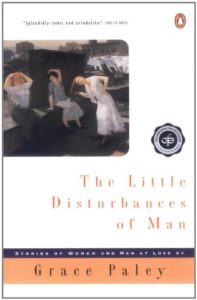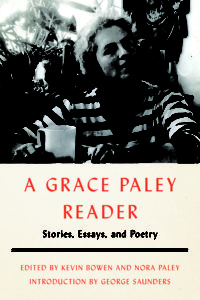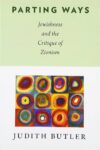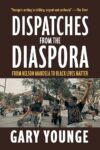I want people to look at the world and see what’s happening
to it and take some action. This planet is so lovable. It is so
various and so lovable, including all sorts of parts of the world
that I’ve never seen, and I’ve seen more than most people.
—Grace Paley to Poets & Writers
When asked by The Paris Review in 1992 if she agreed with Virginia Woolf’s contention that “a writer can’t write if she’s angry,” Grace Paley responded, “The pressure from anger is an energy that can be violent or useful or useless. Also the pressure doesn’t have to be anger. It could be love. One could be overcome with feelings of lifetime love or justice. Why not?” Paley ought to know—as a mother-teacher-activist and writer, her life was overcome by all of these feelings.
 Her 1979 short story “Love,” though something of a cipher, clearly echoes her retort to the Review in its evocation of a love associatively linked to both anger and justice. Like many of Paley’s stories, it proceeds mostly in the form of a winkingly antagonistic conversation, in this case between husband and wife. The story’s narrator is an unnamed woman, a writer. She tells her husband that she’s just finished a poem about love: “I have been looking at the / young people / they speak and embrace one / another.” In response, her husband rattles off a litany of his past love affairs, ending with Dottie Wasserman—herself a Paley character from 1959’s The Little Disturbances of Man. Fed up with the effort of convincing her husband that Dottie was “just plain invented in the late fifties,” the narrator shuffles off to the grocery store. But despite the story’s exaggeratedly domestic tableau and metafictional flourishes, it also features a clarifying moment of tenderness that’s strikingly political in character. While in pursuit of kale, the narrator instead finds a former friend and fellow antiwar activist, Margaret, with whom she had fallen out over a half-remembered internecine conflict: “Some matters related to the Soviet Union separated us.” But the surprise of seeing Margaret after two years of not speaking renders her suddenly affectionate:
Her 1979 short story “Love,” though something of a cipher, clearly echoes her retort to the Review in its evocation of a love associatively linked to both anger and justice. Like many of Paley’s stories, it proceeds mostly in the form of a winkingly antagonistic conversation, in this case between husband and wife. The story’s narrator is an unnamed woman, a writer. She tells her husband that she’s just finished a poem about love: “I have been looking at the / young people / they speak and embrace one / another.” In response, her husband rattles off a litany of his past love affairs, ending with Dottie Wasserman—herself a Paley character from 1959’s The Little Disturbances of Man. Fed up with the effort of convincing her husband that Dottie was “just plain invented in the late fifties,” the narrator shuffles off to the grocery store. But despite the story’s exaggeratedly domestic tableau and metafictional flourishes, it also features a clarifying moment of tenderness that’s strikingly political in character. While in pursuit of kale, the narrator instead finds a former friend and fellow antiwar activist, Margaret, with whom she had fallen out over a half-remembered internecine conflict: “Some matters related to the Soviet Union separated us.” But the surprise of seeing Margaret after two years of not speaking renders her suddenly affectionate:
In a hazy litter of love and leafy green vegetables I saw Margaret’s good face, and before I remembered our serious difference, I smiled. At the same moment, she knew me and smiled. So foolish is true love when responded to that I took her hand as we passed, bent to it, pressed it to my cheek, and touched it with my lips.
Even if the earnestness of this moment is tempered slightly (and in typical Paley fashion) by the husband’s later insistence that his wife must have meant the kiss for someone else, it still feels capacious—buoyant with the possibility of both personal reconciliation and renewed solidarity.
Paley’s humane braiding of love and politics offers a refreshing alternative to the impoverished vision presented by our most recent election cycle and its fallout. In contrast to her tentatively hopeful vision, the kind of “love” lately favored by politicians and pundits is presented as an answer, rather than a question—an end without means. It is what Rebecca Mead called in The New Yorker “love…as an affirmative form of political engagement”—the key word here being affirmative. Mead’s essay, published just after the 2016 Democratic National Convention, reads as unfortunately credulous from the vantage point of late 2017. In it, she writes about Cory Booker’s response to a vaguely threatening Donald Trump tweet that followed Booker’s Convention speech: “I love Donald Trump. I don’t want to answer his hate with hate. I am going to answer it with love.” Despite Mead’s thesis, this statement is not so much political engagement as its exact opposite, and it provided a portent of what was soon to come from mainstream Democrats in the early days of the Trump administration—namely, a refusal to participate in the kind of congressional obstructionism that defined the GOP during Obama’s presidency in the interest of playing nice.
Civility is a debased form of love if ever there was one, yet that’s what many such calls to “love” by politicians amount to—even in the face of racist hatred and violence. In The Fader, Ju-Hyun Park wrote of limply self-righteous public imperatives to “love each other” after August’s white supremacist rally in Charlottesville, Virginia, arguing:
Love does not stand down in the face of terror. Love does not demand silence in the face of injustice or submission in the face of oppression and its attendant brutalities. […] It does not limit itself to the rhetorical or symbolic but extends into the material.
Here, Park is gesturing to an alternative understanding of love’s political power. Mead, to her credit, identifies another—the hippie love of Haight-Ashbury’s “fringe idealists,” who leveraged the concept “as a challenge to the belligerent values of the political establishment.” In The Fire Next Time, James Baldwin, in urging white Americans to reconcile themselves with their country’s racist legacy, writes of love’s ability to “[take] off the masks that we fear we cannot live without and know we cannot live within.” He continues,
I use the word “love” here not merely in the personal sense but as a state of being, or a state of grace—not in the infantile American sense of being made happy but in the tough and universal sense of quest and daring and growth.
Queer love—alongside grief and rage—mobilized AIDS activism, as Deborah Gould chronicles in Moving Politics: Emotion and ACT UP’s Fight against AIDS. She cites a representative speech given by C-FAR member Fred Eggan in 1988, in which he declared that “love does not mean being nice, it means seeing what’s wrong and trying to change it.” Even ousted Frankfurt School theorist Erich Fromm’s surprise bestseller The Art of Loving—now an unfashionable, and in many ways, outdated text—invokes a more revolutionary view of love “as a social and not only exceptional-individual phenomenon,” one that is also, in its idealized form, incompatible with capitalism.
The work of Grace Paley, who was primarily a writer of short fiction, is certainly less polemical than that of the others mentioned here, if no less political. The daughter of exiled Russian-Jewish socialists, her first foray into activism began in 1960 with the founding of the Greenwich Village Peace Center, an organization of her neighbors and fellow PTA members that protested atomic bomb testing and foreign policy in Vietnam. only grew from there: she traveled to Hanoi in 1969 and was arrested multiple times at protests within both the anti-war and burgeoning women’s movements.
But she was also a subscriber to the philosophy that “the personal is political,” before that phrase was attenuated of most of its meaning and used to underwrite an ultimately self-interested worldview. Paley believed that her writing was another way of “doing women’s politics,” and the domestic and social lives of women in New York served as her raw material. Consequently, love became one of her perennial subject matters.
 Though this love was frequently romantic or sexual in nature—“Most of your stories are about male-female relationships,” an interviewer at the Boston Review once observed, to which she replied, laughing, “Yeah, well, I’m interested in it”—it covers a wide range of intimacies. She writes of love between female friends; the love of a single mother for her young children; the way elderly parents love their occasionally prodigal daughter; love within and without marriage; love that fails and love that is granted a surprising third act. George Saunders, in the introduction to A Grace Paley Reader (published by Farrar, Straus and Giroux in April), argues that in Paley’s writing love is elevated to the level of form: “Paley’s model advises us to suffer less by loving more—love the world more, and each other more—and then she gives us a specific way to love more: see better.”
Though this love was frequently romantic or sexual in nature—“Most of your stories are about male-female relationships,” an interviewer at the Boston Review once observed, to which she replied, laughing, “Yeah, well, I’m interested in it”—it covers a wide range of intimacies. She writes of love between female friends; the love of a single mother for her young children; the way elderly parents love their occasionally prodigal daughter; love within and without marriage; love that fails and love that is granted a surprising third act. George Saunders, in the introduction to A Grace Paley Reader (published by Farrar, Straus and Giroux in April), argues that in Paley’s writing love is elevated to the level of form: “Paley’s model advises us to suffer less by loving more—love the world more, and each other more—and then she gives us a specific way to love more: see better.”
And while Politics with a capital P does make a frequent appearance in her fiction, particularly in the later work, it is almost always in the context of these relationships. Faith Darwin, a frequently recurring character who is widely considered a Paley alter-ego, first experiences her political awakening in an incident suffused with maternal care. In “Faith in a Tree,” after witnessing a family’s peaceful anti-war protest in the park being broken up by a police officer who calls it treason, Faith’s older son Richard bursts into angry tears: “I hate you. I hate your stupid friends. Why didn’t they just stand up to that stupid cop and say fuck you.” In chalk, he writes out the message for which the family was expelled. The moment is transformative for Faith:
I think that is exactly when events turned me around changing my hairdo, my job uptown, my style of living and telling. Then I met women and men in different lines of work, whose minds were made up and directed out of that sexy playground by my children’s heartfelt brains, I thought more and more every day about the world.
This enfolding of personal love and political feeling is one of Paley’s signatures, and it appears again in “Wants,” in which her narrator considers a litany of desires both private and communal: she wants “to be the effective citizen who changes the school system” and to have ended the war in Vietnam before her children grew up, but she also wants “to have been married forever to one person.”
Nowhere do these desires brush against each other as closely as in the late Paley story “Midrash on Happiness,” published in 1990. In it, Faith, back again, walks arm-in-arm with her friend Ruthie and enumerates all of the essential ingredients for happiness: children, “a dear person to live with,” women friends with whom she can discuss everything from her personal history to the cruelty of the economy to the stupidity of men, “to do work in this world . . . [including] the work of raising children righteously up […] [by which] she meant that along with being useful and speaking truth to community, they must do no harm.” At this point, watching lovers kiss in Riverside Park, Faith feels that she has forgotten something:
Ruthy, I think I would die without love. By love she probably meant she would die without being in love. By in love she meant the acuteness of the heart at the sudden sight of a particular person or the way over a couple of years of interested friendship one is suddenly stunned by the lungs’ longing for more and more breath in the presence of that friend, or nearly drowned to the knees by the salty spring that seems to beat for years on our vaginal shores.
While initially supportive—“I’m sure, love”—Ruthy offers Faith a tentative rebuke; with all the world’s “boom boom bellicosity,” she says, she can’t understand what Faith means by happiness. Faith is immediately chastened “to have wanted so much and so little at the same time—to be so easily and personally satisfied in this terrible place.” She says to Ruthy, “I know all that. I do, but sometimes walking with a friend I forget the world.”
We readers, however, are not so easily convinced that she had been wrong—the stated pleasures are both too humble and constructive, too beautifully and softly rendered, to be dismissed out of hand. The possibility of these redemptive pleasures lingers. Because Faith’s—and Paley’s—understanding of happiness is, as critic Deborah Heller writes in Literary Sisterhoods: Imaging Women Artists, “shown to include a network of obligations and commitments to others.” It’s communal. At a time when self-care has been effectively sold and “love” mangled to mean turning a blind eye, Paley’s stories seem to offer a way out—a less sanitized and more genuinely compassionate way to live with both ourselves and others. Refuge need not become a synonym for complacency. As Faith suggests, sex and romance, friendship and family may be where we turn to flee the world. But they’re also where we’re assured to encounter it once more, if we look. And where we might find the strength to, as Richard pleaded in the playground, stand up and say fuck you.
In “Pleasure: A Political Issue,” Frederic Jameson concludes that “the right to a specific pleasure, to a specific enjoyment of the potentialities of the material body—if it is not to remain only that, if it is to become genuinely political […] must always in one way or the other be able to stand as a figure of the transformation of social relations as a whole.” We know that this transformation is precisely what Paley always sought. We know it because she told us. In perhaps her most famous poem, “Responsibility,” she writes,
It is the responsibility of the poet to say many times: there is no
freedom without justice and this means economic
justice and love justice
Paley’s vision of liberation encompasses much more than survival; it is also the universal right to intimacy, tenderness, and care. “Everyone, real or invented,” she insists in “A Conversation With My Father,” “deserves the open destiny of life.” If that’s not love—what is?
Jess Bergman is the features editor at Literary Hub.
This post may contain affiliate links.







